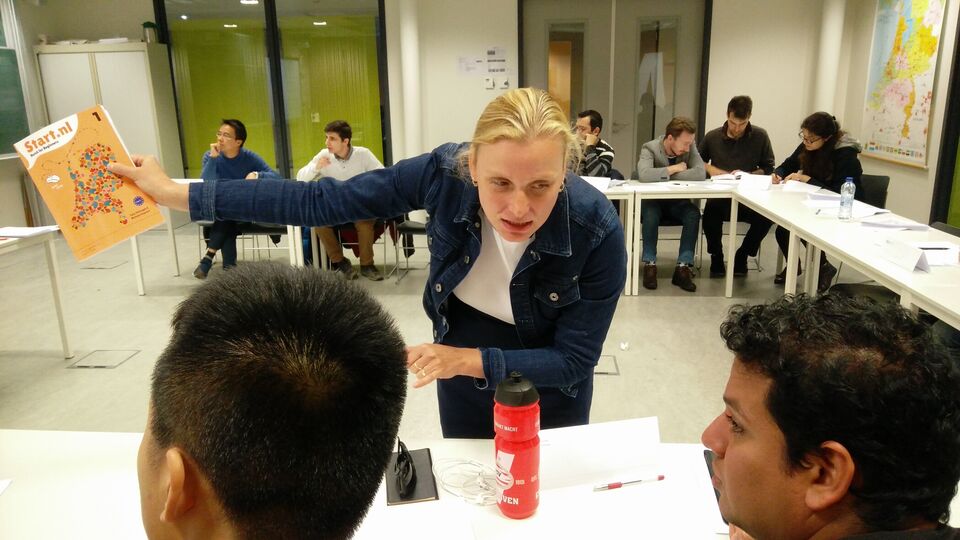
- Student
- 29/09/2017
Language lessons for beginners : Does this word end in 't'?
For someone who can easily read the Dutch postings on Cursor.nl it may be difficult to imagine all the problems people encounter in their efforts to learn the Dutch language. “Jij studeer? [You study?]” One hundred and twenty students and staff are grappling with the language on the Dutch for Beginners level 1 course at the TU/e Language Center. Katerina Lepkova is one of the NT2 (Dutch as a second language) lecturers. Patiently and while being complimentary to her students, she discusses the exercises in the teaching method Start.nl.
‘Eén stad, twee staden. [One city, two citys] Dit jaar studeert jij Nederlands. [This year you is studying Dutch.] John wast hij. [John washes him]’ It is amusing to study the errors the students are still making on the Dutch for beginners course. They are doing lesson four, and already they are hard at work conjugating difficult verbs.
It is difficult for Asians, South Americans, in fact for everyone whose first language isn't Dutch, to decide whether the 'informal you' form takes a 't' at the end, especially when the verb has to be inverted. Conjugating regular verbs isn't a problem - these are intelligent students - but ‘Dit jaar studeert jij Nederlands [This year you is studying Dutch]’ and ‘Dit jaar studeren hij Nederlands [This year he are studying Dutch]’ sound no less plausible to them than the correct versions.
The reflexive verbs prompt some deep thinking. There are illustrations in the textbook and the students have to create appropriate sentences for them. Daming Lou tries: “John wast hij”. His neighbor Juan Gonzalez Huesca corrects him: “Nee, John wast zich.” Juan, Mexican, is helped a little by the fact that he has spent a year living in Germany. He has been in Brabant for a month and would like nothing more than to stay. As a committed PSV fan he went along to watch a training session at the Herdgang this morning. He is attending the lessons so that he can finally learn how to make small talk in Dutch.
Iranian Mahmood Mirzakhalili is here because he wants to understand the jokes his Dutch friends make. The Master's student of Electrical Engineering has been living here for five years now. At these lessons he got to know Pegah Bahramiani, also from Iran, who has just started the study program Embedded Systems. “I like learning new languages and I want to be able to understand what people around me are saying.” After English, Farsi, French and Arabic, Dutch is the fifth language he has turned his hand to learning.
Lecturer Lepkova, herself Czech, is proud of her pupils. “The pace is very fast. They have a hard time practicing because Dutch people switch so easily to English. At the start of the next series of lessons we are thinking of handing out buttons with the message, ‘Please speak to me in Dutch’.
The next-level courses have nearly two hundred participants. After Beginners 1, comes part 2, then Intermediate 1 and 2, and Advanced 1 and 2. Each course is a set of eight lessons, mostly once a week. The teaching method Start.nl is a type of blended learning. On the website the teachers speak English, the textbook is in Dutch. The Dutch culture is a recurring theme, with some aspect of it being presented in a short English text in every chapter. These address, for example, the bonus card at supermarkets, and the differences between personal and anonymous public transport chip cards.
You can register for language lessons at the TU/e Language Center (Education and Student Affairs).
Discussion